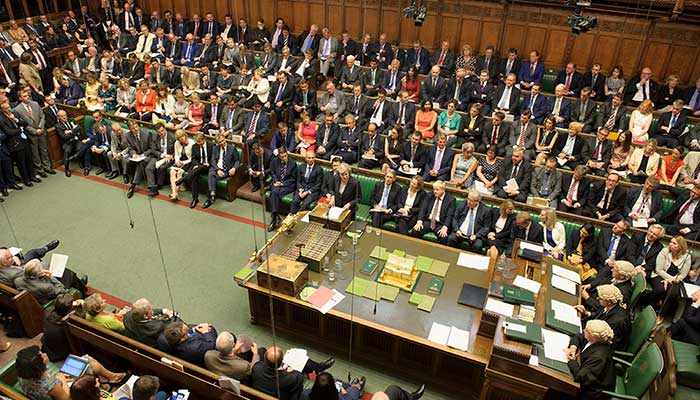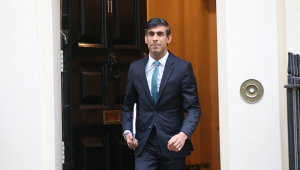
For a day that began with much anxious online searching of parliamentary order papers to check that we would even have a fiscal event, after the sturm und drang of Tuesday’s parliamentary season opener. It’s there.
We saw and heard the chancellor be twice warned off by the speaker for being ‘out of order’ for his rather Brexity introductory spiel. It’s an experience whose reality we can believe through the shared experience of our Twitter timeline.
There’s surety enough for next year’s departmental spending limits and public service budgets, no previously unprotected department is going to come a cropper, so presumably trebles all round SW1.
If in life, context is everything, where do we assign the significance or durability of a Spending Round conducted at lightening pace? In this, chief secretary to the Treasury, Rishi Sunak, has been a sort of Billy Whizz to The Saj (perhaps channelling Wilfrid from ‘The Bash Street Kids?) – delivering the spending goods at lightning pace for an election that may happen either sooner or later than we think.
There is a lot to be said about a seemingly throwaway pre-electoral Spending Round. Alastair Darling’s final outing was in many ways rather more prescient and realistic about achievable deficit reduction than what transpired under George Osborne’s long and full watch in the coalition years. Kenneth Clarke, the Rushcliffe MP and one of two former chancellors to be stripped of the Conservative whip last night, saw his financial plans continued for the first four years of New Labour’s first term.
The Saj trousered £13.8bn of the available £15bn fiscal headroom to come good on Boris Johnson’s pledges for 20,000 additional policemen, prisons, schools and hospital improvements. All this and an extra £2bn in Brexit planning which his immediate predecessor as chancellor, Philip ‘Showtime’ Hammond, also denuded of the Conservative whip, had refused.
It’s probably doubly safe to say that at the end of a long, stretched out decade, the age of austerity is at end. And this reaffirmed end to the previous austerity regime spells the beginning of a new set of fiscal rules for us to follow and keep watch on at the next Budget.
'It’s probably doubly safe to say that at the end of a long, stretched out decade, the age of austerity is at end. And this reaffirmed end to the previous austerity regime spells the beginning of a new set of fiscal rules for us to follow and keep watch on at the next Budget.'
In the further delayed absence of a social care funding green paper, there’s an extra £1bn in new money for local government and a further £500m on offer from hiking council tax charges. This amounts in the phrase beloved of Tory election guru Sir Lynton Crosby, ‘scraping the barnacles off the boat’ before the next election.
From the view of refortifying place-based health, a real terms increase in the Public Health Grant and NHS contribution to the Better Care Fund will not admittedly restore all the ground lost in public health clawbacks from recent years. But it’s not to be begrudged and will surely restore some spring into preventative health as a force for good.
Again, in contrast to the 2010 Spending Review which set in train what became known as a ‘death slide’ of capital funding cutbacks, the chancellor talked up an infrastructure revolution and earmarked an extra £1.7bn.
Clean growth, buses and trains, broadband and mobile coverage, all awaiting an ‘ambitious strategy’ and a new framework for investment at the next Budget – however and whenever this takes place.
But as we would expect, this is an investment focused on cherished goals of long-term productivity, one which will force them to show real value for money, with credible delivery plans and budgets. And possibly not the best news for HS2 depending on who is the next chancellor.
The £3.6bn Stronger Towns Fund was reaffirmed and pledges to improve transport in the North restated. Possibly just as important for local economies and the desperate need to improve skills provision, an extra £400m was targeted at further education, the uber-Cinderellas of our public service landscape.
Sufficient unto the year is the Spending Round thereof. In the longer-term we are - in Keynes’ famously morbid words - all dead.
For a genuinely solid financial foundation for local government, returning to the pre-coalition trajectory of expenditure is not possible. In this case, the argument must be stretched in the direction of longer-term moves towards fiscal devolution, on the universal understanding council tax and business rates revenues will not suffice to meet further care and local service demands.
This is more of a marathon than the record-breaking sprint which Rishi Sunak and HM Treasury have accomplished in this fastest of Spending Round processes. It’s not a big retail offer to voting punters in a Brexit election. But it would promise to establish a stronger and more stable local state upon which an infrastructure and local economic revolution might be built.




















